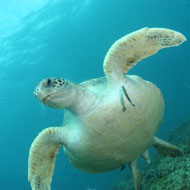
Study quantifies the impact of plastic pollution
Eating just one piece of plastic can be fatal for sea turtles, new research by CSIRO has found.
Scientists analysed nearly 1,000 turtles that were found dead and washed up on beaches around Australia.
Their findings show turtles had a 22 per cent chance of death if they had eaten a single piece of plastic. Once there were 14 pieces in the gut, the likelihood increased to 50 per cent.
This is the first time scientists have quantified the risk that plastic pollution poses to sea turtle populations.
Principal scientist Dr Chris Wilcox said: “We knew that turtles were consuming a lot of plastic, but we didn't know for certain whether that plastic actually caused the turtles' deaths, or whether the turtles just happened to have plastic in them when they died.”
"In other words, we wanted to know 'How much plastic is too much plastic?' for sea turtles."
Globally, it is estimated that 52 per cent of sea turtles have ingested plastic. The species was among the first to be recorded eating plastic debris, a phenomenon that occurs in all seven marine turtle species.
Dr Wilcox said: "The model we've developed can be adapted to help us understand the impact of plastic ingestion not just on individuals, but whole populations of other endangered marine species as well. "
The better we understand the issue, the better equipped we are to address the problem, and work towards viable, scalable solutions."
Image © Kathy Townsend, University of Sunshine Coast



 The veterinary mental health charity Vetlife is inviting the veterinary community to join it for a sponsored cold-water dip.
The veterinary mental health charity Vetlife is inviting the veterinary community to join it for a sponsored cold-water dip.